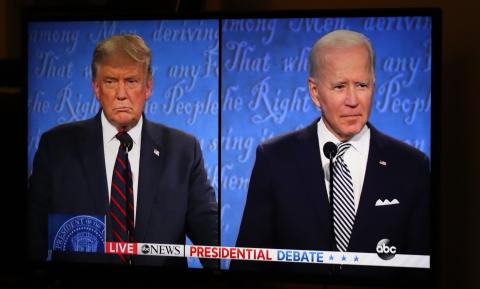Photo Credit: Elvert Barnes / Flickr
Major national news outlets reportedly are drafting an open letter to President Joe Biden and former President Donald Trump's campaigns urging them to debate this fall. Biden's campaign has threatened not to debate at all, and Trump doesn't have a solid track record committing to debates.
Presidential debates can serve as an important forum to educate voters on the candidates, the issues, and where the campaigns stand on the things that matter most to Americans. But for decades, the debates have also served to endorse the major party candidates -- and only their candidates.
The New York Times reports:
"The letter — endorsed by ABC, CBS, CNN, NBC and Fox News — thrusts into public view a question that has swirled within media and political circles: whether the presidential debates, one of the nation’s last remaining mass civic rituals in a polarized age, will occur this year at all."
If even one of the major party candidates refuses to show, then the Commission on Presidential Debates would rather cancel the debates entirely than extend an invite to an independent or third-party candidate who could present voters with an alternative option.
This happened in 2020. Trump had long threatened not to participate in the fall presidential debates against Biden, and dropped out of the second debate. The debate commission didn't offer his spot to Libertarian presidential nominee Gary Johnson or Green Party nominee Dr. Jill Stein.
It canceled the debate and Trump and Biden participated in separate town halls instead.
This time around it is not Trump threatening not to show. It is Joe Biden, who has refused to commit to debate because -- according to the NYT -- his campaign is worried that the debate commission "will be unable to enforce the rules when Mr. Trump takes the stage."
It's clear the threat of no debates is so serious that ABC, CBS, CNN, NBC and Fox News have collaborated on a letter to the campaigns. Here's a thought: Send that letter to the Commission on Presidential Debates and urge it to change its rules for candidate inclusion.
For a quarter of a century, the debate commission has implemented rules that have made it all but impossible for independent or third-party candidates to appear on the debate stage. Specifically, its "15% rule" has killed any chance a third option might have.
LEARN MORE: Everything You Need to Know About the Commission on Presidential Debates
Simply put, the Commission requires candidates to poll at 15% or higher in 5 national polls handpicked by its members. The thing is, these polls seldom include independent and third party candidates or bury them in the questions. It makes voters think they only have two options.
The same can be said for media coverage of candidates outside the two major parties. They will either be ignored or demonized. Either way, unless a candidate has hundreds of millions of dollars to pay for their own media time, it is difficult for them to bolster their name ID.
This is intentionally done by influential figures who operate under a two-party duopoly. While some groups have challenged the debate commission's rules, including in the courts, the suppression of choice continues in presidential elections.
The last presidential debate that featured an independent candidate was held in 1992 when Ross Perot shared the stage with George HW Bush and Bill Clinton. Incidentally, it remains one of the most watched debates in US history. So, if networks are concerned about ratings -- this is something to consider.
Also, threatening to give media time generally reserved to the parties to candidates they feel threatened by might be enough to get the Trump and Biden campaigns on board. And if one of the candidates agrees, would the other refuse in an election that is expected to be closer than 2020?
This is an opportunity to rethink the way the US does presidential debates. Will it happen? Likely no. The Commission on Presidential Debates was founded by and is comprised of prominent members of both major parties. It, like many things in the nation's elections, exists to serve their interests.
